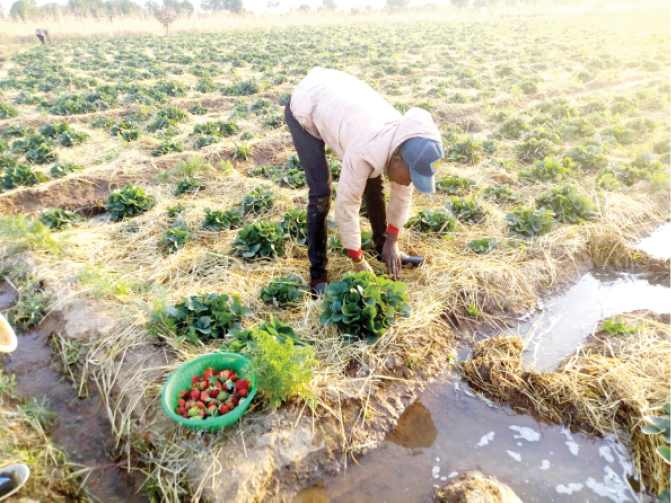‘Real farmers find it difficult to access bank loans’
In the last four years, there have been increased activities around commercial banks lending to agriculture, the area they once considered unsafe. Banks have been rolling out huge figures in the sector, in addition to organising agricultural show and expo to stress how significant they have become the country’s food security drive. For example, the […]

A strawberry farmer in Chaha area of Jos, Plateau State
In the last four years, there have been increased activities around commercial banks lending to agriculture, the area they once considered unsafe.
Banks have been rolling out huge figures in the sector, in addition to organising agricultural show and expo to stress how significant they have become the country’s food security drive.
For example, the United Bank for Africa (UBA) is said to have spent over N85 billion in lending to the agricultural sector.
Sterling Bank, in a just-concluded agric expo, said they had so far sunk N10 billion into the sector.
Union Bank, on its website, said it had launched its N10 billion agricultural funding scheme on the platform of the Nigeria Incentive-Based Risk Sharing System for Agricultural Lending (NIRSAL), an all-inclusive lending programme established to de-risk lending to the Nigerian agricultural sector.
First Bank agric portfolio recorded a growth of N11.65billion in the last one year.
Other banks like the First City Monument Bank (FCMB) has introduced an enhanced agro-commodity trade finance facility for agribusiness operators.
The banks target commodities like cocoa, cashew nut, sesame, ginger, palm oil, grains like maize, sorghum, soya beans, paddy rice.
Under the FCMB, a processor can access working capital of at least N100 million and a maximum of N2 billion.
Despite all these funds, many farmers think those accessing these credit facilities are mostly not real farmers. According to them, the real farmers most times find it extremely difficult to get these loans because of the stringent condition for accessing it.
“Most times, those political farmers or public office holders who also have farms are the ones that easily get these loans that run into millions of naira. I know a former minister who got hundreds of millions from Zenith Bank to resuscitate his farm in Kuje. It would have been very difficult for him to do so if he wasn’t a minister,” a farmer who wouldn’t want to be mentioned said.
The source said that despite the 9 percent interest rate, the hurdles for accessing commercial banks credit facilities remained unchanged and only the powerful get these funds.
Chief Daniel Okafor, the leader of potato farmers in the country, however, believe the money that banks claimed it was committing don’t really go into the sector but other businesses.
He said there was an increased activity around commercial banks’ agricultural loans because of the low-interest rate (9%) introduced by this administration and guaranteed by the NIRSAL.
With this low-interest rate, bankers’ friends, cronies and public office holders rush for these loans and divert them to their other businesses, adding that the farms they set up are just window dressing, but the real money goes elsewhere.
“My group’s encounter with the Bank of Agriculture is not what I can say, let alone commercial banks. They paid and collected loan forms, and after everything, they were asked to provide two guarantors, civil servants of senior grade level for a loan of N150,000 and ensure N30,000 in their accounts. A real farmer behind Gosa market to look for civil servants, from where?
“My experience with commercial banks is something else. I wanted to buy tractors this year but couldn’t because the banks were asking for houses in Abuja. They don’t even want lands anymore because I have 10 hectares of land and they said no.
“Quote me anywhere, I challenge any of the commercial banks to publish the names of farmers who collected these billions, let’s see if they are listed among the real farmers we know in this country,” Chief Okafor stressed.
A poultry farmer, Abdulrazak Ibrahim, said that banks’ renewed interest in agriculture was to benefit from several funding windows for agriculture from the Central Bank of Nigeria (CBN) and not because they have an interest in the sector.
“It is so common these days to hear that banks have disbursed billions of naira to farmers, but who are these farmers? You are a journalist, so ask the banks to give you the names and addresses of the beneficiaries. Go there and investigate, you will be shocked that very few of them are actually doing something serious in the sector,” he said.
For farmers like Ms Elizabeth Jibrin, the reality on the ground is difficult for the average farmer to access loans from commercial banks, something she promised not to indebt herself to.
